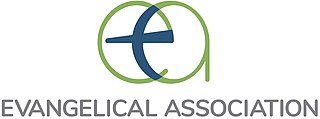
A creed, also known as a confession of faith, a symbol, or a statement of faith, is a statement of the shared beliefs of a community in a form which is structured by subjects which summarize its core tenets.

Ecumenism – also called interdenominationalism, transdenominationalism, or ecumenicalism – is the concept and principle that Christians who belong to different Christian denominations should work together to develop closer relationships among their churches and promote Christian unity. The adjective ecumenical is thus applied to any interdenominational initiative that encourages greater cooperation and union among Christian denominations and churches.

The Westminster Confession of Faith, or simply the Westminster Confession, is a Reformed confession of faith. Drawn up by the 1646 Westminster Assembly as part of the Westminster Standards to be a confession of the Church of England, it became and remains the "subordinate standard" of doctrine in the Church of Scotland and has been influential within Presbyterian churches worldwide.

The World Evangelical Alliance (WEA) is an interdenominational organization of evangelical Christian churches, serving more than 600 million evangelicals, founded in 1846 in London, England, United Kingdom to unite evangelicals worldwide. WEA is the largest international organization of evangelical churches. The headquarters are in Deerfield, Illinois, with UN offices in New York City, Geneva, and Bonn. It brings together 9 regional and 143 national evangelical alliances of churches, and over one hundred member organizations. Moreover, the WEA includes a certain percentage of individual evangelical Christian churches. As of March 2021, the Secretary General of the WEA is German theologian Thomas Schirrmacher.
The Wesleyan Church, also known as the Wesleyan Methodist Church and Wesleyan Holiness Church depending on the region, is a Methodist Christian denomination in the United States, Canada, the United Kingdom, South Africa, Namibia, Sierra Leone, Liberia, Indonesia, and Australia. The church is aligned with the Wesleyan-Holiness movement and has roots in the teachings of John Wesley. It adheres to Wesleyan-Arminian doctrine and is a member of the World Methodist Council.

The Alliance World Fellowship or Christian and Missionary Alliance is an international evangelical Christian denomination within the Higher Life movement of Christianity, teaching a modified form of Keswickian theology. The headquarters is in Reynoldsburg, Ohio, United States.

The Pentecostal Assemblies of Canada (PAOC) is a Pentecostal Christian denomination and the largest evangelical church in Canada. Its headquarters is located in Mississauga, Ontario.
The Evangelical Fellowship of Canada is a national evangelical alliance, member of the World Evangelical Alliance. Its affiliates comprise 43 evangelical Christian denominations, 66 Christian organizations, 38 educational institutions, and 600 local church congregations in Canada. It claims to represent nearly 2 million Christians. The head office is in the Scarborough district of Toronto, Ontario. Its president is Bruce J. Clemenger.

Believers Eastern Church is an episcopal church with Orthodox faith of Indian origin with congregations and parishes worldwide. The church now follows an episcopal governance. The church holds Christ as the head of the Church but also requires that bishops and ordained ministers swear to submit to its metropolitan and any successors of the metropolitan. It is governed by a committee of bishops, the synod, with one central bishop holding the honorary title of "first among equals" and follows Evangelical Christian doctrine. Believers Eastern Church is administratively based in the state of Kerala in southwestern India. In 2015, the church reported it was re-organized into 33 dioceses; a decrease from the 36 dioceses reported by Smith in 2009. According to Believers Eastern Church, it claims its membership consists of more than 3.5 million people in 10 countries speaking a hundred languages. The Church has 30 bishops, and the Metropolitan Bishop is Moran Mor Athanasius Yohan Metropolitan.

The Assemblies of God USA (AG), officially the General Council of the Assemblies of God, is a Pentecostal Christian denomination in the United States. The Assemblies of God is the U.S. branch of the World Assemblies of God Fellowship, the world's largest Pentecostal body. With a constituency of 3,041,957 in 2011, the Assemblies of God was the ninth largest Christian denomination and the second largest Pentecostal denomination in the United States, growing to 3,295,923 in 2019. Since then, its adherents have declined to 2,928,143 in 2022.
Biblical Witness Fellowship is an evangelical renewal movement composed of members of the United Church of Christ. Founded in 1978 as the United Church People for Biblical Witness, the movement reorganized as the Biblical Witness Fellowship at a national convocation in Byfield, Massachusetts in 1984, hosted by the current president of BWF, the Rev. Dr. William Boylan.
Free grace theology is a Christian soteriological view which holds that the only condition of salvation is faith, excluding good works and perseverance, holding to eternal security. Free Grace advocates believe that good works are not the condition to merit, to maintain, or to prove salvation, but rather are part of discipleship and the basis for receiving eternal rewards. This soteriological view distinguishes between salvation and discipleship – the call to believe in Christ as Savior and to receive the gift of eternal life, and the call to follow Christ and become an obedient disciple, respectively.

The Evangelical Association of Reformed and Congregational Christian Churches is a fellowship of conservative evangelical Protestant Christian congregations in the United States that became disaffected from the United Church of Christ due to that denomination's national entities professing support for practices such as abortion and homosexuality. Unlike other more sectarian churches, the Evangelical Association does not forbid its member congregations to simultaneously belong to other denominations and fellowships, as the local churches continue to practice congregational polity.

Wesleyan theology, otherwise known as Wesleyan–Arminian theology, or Methodist theology, is a theological tradition in Protestant Christianity based upon the ministry of the 18th-century evangelical reformer brothers John Wesley and Charles Wesley. More broadly it refers to the theological system inferred from the various sermons, theological treatises, letters, journals, diaries, hymns, and other spiritual writings of the Wesleys and their contemporary coadjutors such as John William Fletcher.

The United Church of Christ in the Philippines is a Christian denomination in the Philippines. Established in its present form in Malate, Manila, it resulted from the merger of the Evangelical Church of the Philippines, the Philippine Methodist Church, the Disciples of Christ, the United Evangelical Church and several independent congregations.

The Evangelical Network (TEN) is an association of Christian and Evangelical ministries that are a part of and are affirming to the LGBTQ community and their relationships. The TEN website describes its focus in a mission statement including the following goals:

The Evangelical Free Church of Singapore (EFCS) is a national denominational coordinating body for the Evangelical Free Churches (EFC) in Singapore, which are churches that are congregationalist in polity. These churches share common heritage and Christian beliefs. However, each individual local church is self-governing as a congregational church with its own church board or council. EFCS was established in 1961. It was registered as a charity in 1985. Concurrently, evangelical free churches were also established in Malaysia from 1963. They eventually became the Evangelical Free Church of Malaysia, after Singapore and Malaysia became separate countries in 1965.












